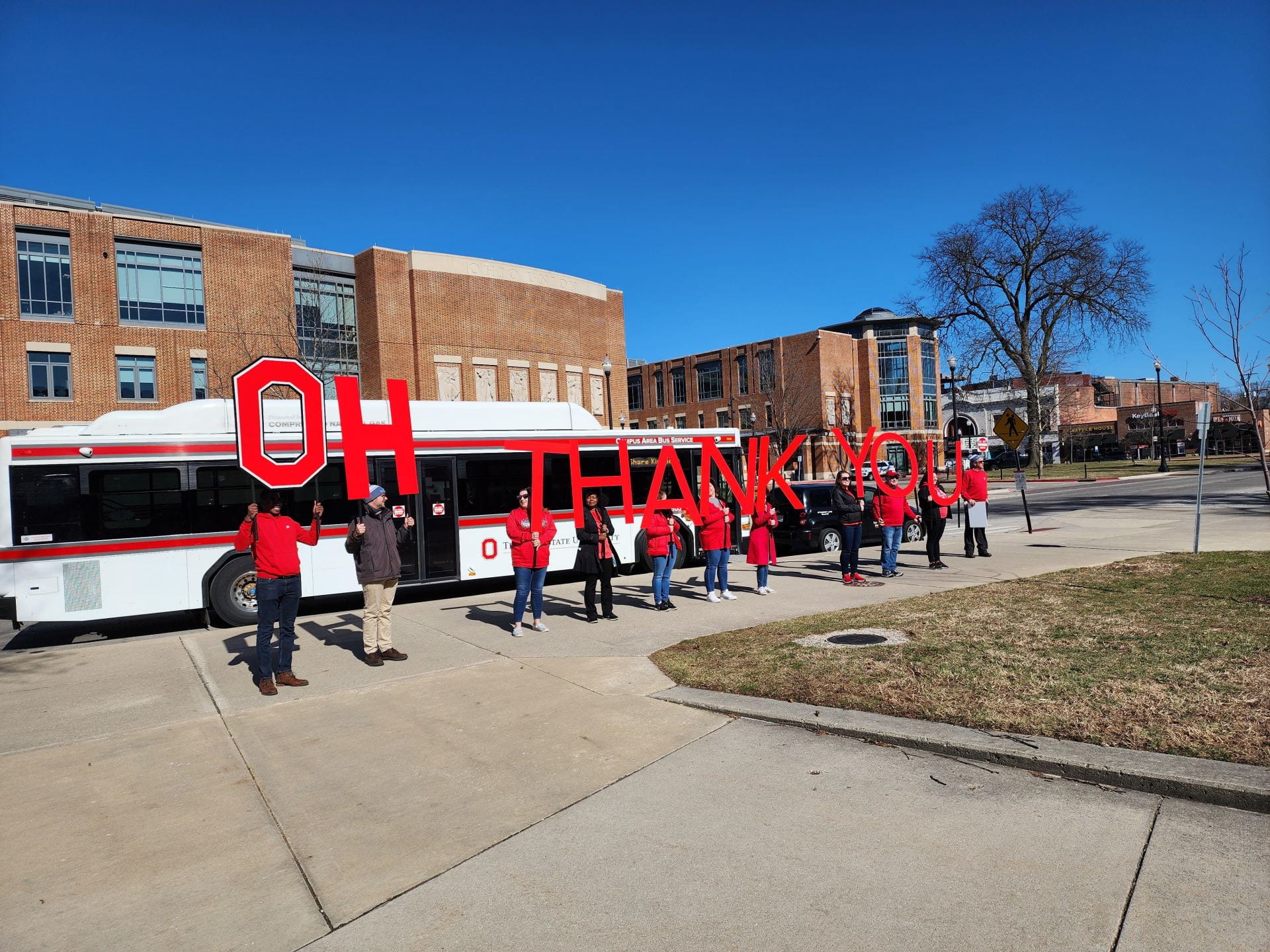
The Office of Student Life and University Marketing and Communication come together to hold up large letters spelling “thank you” as a surprise gesture for Beth Watkins, assistant dean for career development at Moritz College of Law. Credit: Nathan Mader | Lantern File Photo
When Anthony Long II was asked by the Office of Student Life if there was anybody on campus he wanted to pull out of the office and surprise with a “thank you bus,” he thought of his career adviser.
Long dragged Beth Watkins, assistant dean for career development at the Moritz College of Law, outside Drinko Hall where a group of staff from Student Life and University Marketing and Communications, each carrying a large red letter, had emerged from a bus and lined up to spell “OH thank you” while chanting “Thank you, Beth.”
Long, a third-year in law, said the surprise was meant to send a message of gratitude to remind those at Mortiz that others see the work they do.
“Immediately, I thought of the law school because sometimes we can feel siloed in our building, and immediately I thought about Beth,” Long said.
Surprises such as these are a part of Ohio State’s celebration of Random Acts of Kindness week Feb. 12-18 with National Random Acts of Kindness Day Friday.
University spokesperson Dave Isaacs said the university, through the concept of Buckeye Love, will perform and encourage surprise acts of kindness for students, staff and faculty with treats and other expressions of gratitude throughout the week.
“The goal is to spread kindness, and it really is just that simple,” Isaacs said.
Isaacs said previous years have included signs with uplifting messages to pizza parties and succulents students gift others. Signs encouraging kindness on campus and opportunities to send notes of appreciation have already popped up, and Isaacs said there are more plans for other expressions of gratitude to be distributed throughout the week.
Nicholas Epley, a professor of behavioral science at the University of Chicago Booth School of Business, conducted a study about the positive impacts acts of kindness had on both performers and recipients, and he said positive connections have physical benefits to one’s health.
“Feeling disconnected from other people is a social stressor,” Epley said. “It increases cortisol in your bloodstream — compromises your immune system functioning. It impairs cardiovascular functioning, and all of that is bad for your health.”
Epley said the study found people don’t always engage in acts of kindness when they have the opportunity because they tend to significantly underestimate how much the recipient will appreciate the gesture while also overestimating how awkward the encounter will be.
Epley said participants in the study also typically reported a boost in their overall mood after performing an act of kindness because it fulfills three important psychological needs — a sense of autonomy, competence and building important relational connections.
“The people in our experiments who performed these acts of kindness say it required very little effort to do a lot of these things, but they had a really outsized positive effect on the recipient,” Epley said. “For someone who’s feeling stressed out and they’re overly focused on whatever is happening in their own life, I think these acts of kindness are a massively positive way to enrich your own life — to make it a little better.”
For students, faculty and staff looking for ways to spread positivity this week and in the future, Isaacs said to focus on the little things to promote a smile, and he said tokens of appreciation can be sent from the kudos section of the Office of Student Life Website.
“It’s those little things — those small gestures — that can be so uplifting and so important in all of our lives,” Isaacs said.
Watkins said she appreciates Long for thinking of her and letting her know how she impacted his life.
“In February especially,” Watkins said, “when we’re in the gray Ohio winters, it’s a good time to feel appreciated.”


